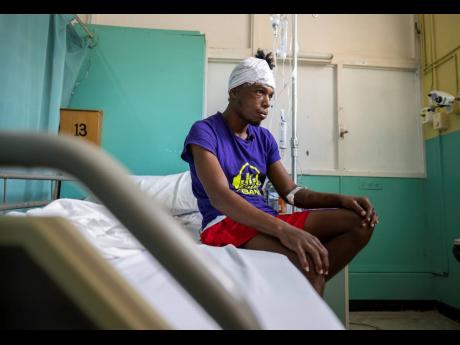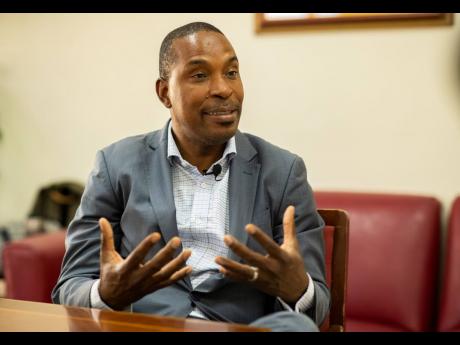Taxpayers to foot multimillion-dollar domestic dispute bill
Doctor begs Jamaicans to resolve disagreements without violence as trauma cases continue to burden public health system
A long-standing quarrel between two men from the rural agriculture and fishing district of Alligator Pond in Manchester has left taxpayers with a multimillion-dollar bill racked up at the Mandeville Regional Hospital and University Hospital of the...
A long-standing quarrel between two men from the rural agriculture and fishing district of Alligator Pond in Manchester has left taxpayers with a multimillion-dollar bill racked up at the Mandeville Regional Hospital and University Hospital of the West Indies (UHWI) in the space of days.
According to the representatives of the hospitals, in three weeks, both institutions have spent more than $10 million and counting to save the life of Lamar Nephew, who was shot in the head with a five-foot metal arrow from a makeshift bow, a foot of which lodged in his skull.
The five-hour procedures between both hospitals to remove the arrow from his skull and save his life is considered by the doctors “a case for the ages”.
Nephew remains a patient at UHWI.
According to reports, Nephew and a man from the community, known mostly for Blackie’s Seafood, have been involved in a long-standing dispute. Almost three weeks ago, both men had a verbal altercation which resulted in one of them being injured with a knife. On Sunday, April 30, Nephew was shot in the head with an arrow from a makeshift bow – a contraption that was reportedly created to do spearfishing.
He was taken to the Mandeville Regional Hospital and later transferred to UHWI, where a high-level team of neurosurgeons performed the delicate procedure.
Poor and unable to pay for his medical care, taxpayers will have to foot Nephew’s multimillion dollar bill for costs associated with the surgeries, CT scans, CT angiogram, general anaesthesia, digital subtraction angiogram, occipital craniotomy, fronto-temporal craniotomy, skull base approach, post-surgery CT, post-surgery digital subtraction, angiogram, ICU admission for days, operating theatre time, three weeks of high-powered antibiotics, pain medication, cutting devices, and disposables for the angiograms. And the list goes on.
HERE TO SAVE LIVES
Chief of Medical Staff at UHWI Dr Carl Bruce said their only interest was saving his life, with no thought about the cost.
“At the UHWI, when a patient has been injured by whatever means, including inter-personal disputes, our position has always been since 1948 and remains the same. We are neutral. Our job is to take care of that patient, apply the standard of care to stabilise the patient, in this case, ensure that all emergency protocols are followed, and that we treat the patient with the standard of care that’s available worldwide,” Dr Bruce told The Sunday Gleaner.
Thanks to that policy, the 32-year-old labourer, who came near to death, will leave the hospital shortly with all his faculties intact and only a small scar just below his left eye socket as the visible evidence of the trauma.
Dr Bruce, a consultant neurosurgeon, said UHWI has dealt with various types of injuries for many years but when he received the call from another neurosurgeon, Dr Ronette Goodluck Tyndall, and the nature of the injuries were described to him, he knew it would not be an ordinary Sunday, as the injury was very unusual.
A large team of specialists from across the hospital was immediately mobilised and assembled.
Mandeville Regional had cut off a piece of the arrow. And when Nephew arrived at UHWI, more than three feet was protruding from his face, and a length lodged in his skull.
Doctors said the missile entered on the trajectory of a plane taking off, up through his skull and brain, stopping few millimetres from exiting, towards the top and back of his head.
Dr Bruce paused for an unusual five seconds when he was asked what was his first thought on seeing the initial images.
“My first thought, believe it or not, I whispered and said ‘thank God he was alive’, and the second thought was, ‘I hope nobody moves this or tries to take it out’,” he recalled.
‘PREVENTION IS BETTER THAN CURE’
Dr Bruce is pleading with Jamaicans to be more thoughtful of others and resolve their differences peacefully.
He told The Sunday Gleaner that over several decades the hospital’s Department of Surgery has amassed a large database of trauma cases in which foreign objects have been used to cause harm in violent confrontations. An analysis of such data has caused them to recommend prevention of these types of injuries.
“Dispute resolution, how we relate to each other and how we resolve our differences are things the public must hear constantly. The way we resolve disputes must be important to us as a country, and if we learn anything from this case, thank God the young man is alive and well, is that if everyone takes a step back, it does not have to get this far,” he stated.
“Even though we have the expertise at UHWI, it is always better to go back to the old-time saying that ‘prevention is better than cure’. Take a deep breath. Step back. And if you do that, we will be able to give attention to the patients who need that healthcare dollar. If we could reduce the burden of trauma on the health sector, then it would be better able to provide some of the elective and other urgent treatments that are urgently needed.”
A 2014 report in the West Indian Medical Journal titled ‘Trauma in the Developing World: the Jamaican experience’ noted that “trauma remains a challenging burden on the often underfunded healthcare systems of developing countries. Ten-year data from the Jamaica Trauma Registry show that trauma accounts for 20 per cent of surgical admissions, with close to 50 per cent being intentional and with a five per cent mortality. There is a good opportunity for various preventive programmes to be instituted to reduce the burden of this disease.”
Ninety per cent of such injuries were preventable, the report said.
And according to Jamaica’s Cost of Care report, direct and indirect medical cost of treating injuries at public facilities resulting from violence, road traffic crashes and attempted suicides in 2014 totalled $12.6 billion. Commenting on the report, Health Minister Dr Christopher Tufton said trauma cases account for 59 per cent of the ministry’s resources.
“More often than not, we place too little effort on the preventative side. What the study does is to provide the support for placing more resources and effort on prevention, because prevention is, indeed, better than cure,” the minister noted.
The Ministry of Justice, through its Restorative Justice programme, is working to have persons involved in disputes seek a non-violent, out-of-court resolution.
‘WE HAVE A VIOLENT HISTORY AND CULTURE’
Retired policeman Llewellyn Wynter told The Sunday Gleaner that Jamaicans lack the capacity to settle conflicts peacefully.
“We have a violent history and culture. People attack each other without even being provoked. Being a photographer now, I find the level of hostility in the society to be unprecedented. You are at a scene and taking photos and people are walking in the frames and threatening you that they hope you are not taking their photos. The photos often have nothing to do with them,” he told The Sunday Gleaner.
“I am afraid that it will get worse unless there is some massive intervention. We often start programmes in the schools, but look at what is happening in the schools. It’s a breeding ground for violence,” said the retired cop, who gave nearly 40 years of service to the Jamaica Constabulary Force.


